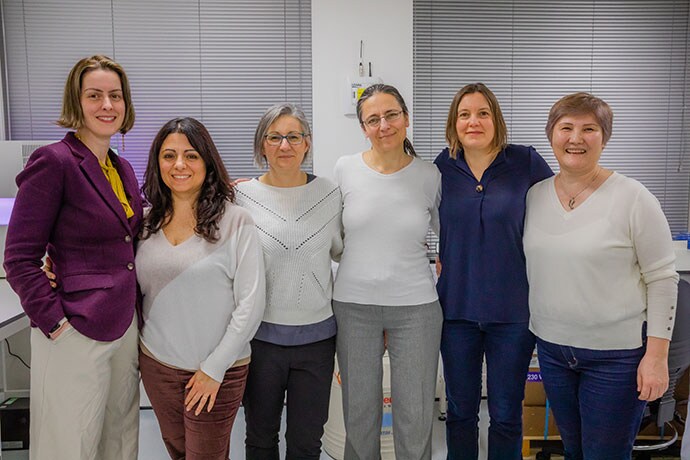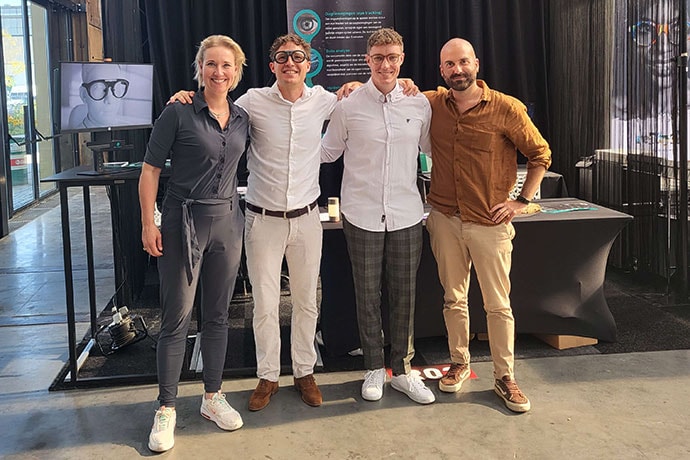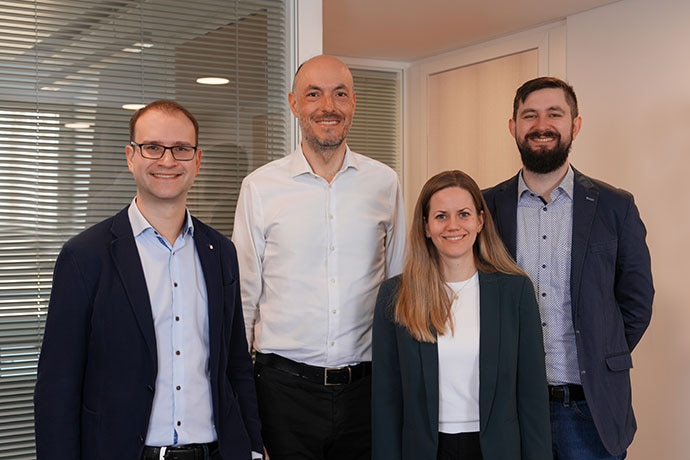Nearly eight million Europeans are affected by glaucoma, and one quarter will suffer a stroke in their lifetime. Antimicrobial resistance is still high in most European countries, and cancer kills 1.2 million people every year.
Artificial intelligence (AI) has the potential to reduce this massive health burden. European healthcare start-ups will pitch their AI-based technologies for the Breakthrough of the Year award at the upcoming Falling Walls Summit in Berlin.
The innovations presented include AI-powered precision diagnostics for the early detection of cancer, novel one-blood-drop cancer tests, drug discovery platforms for developing new antibiotics against multidrug-resistant bacteria, robotic exoskeletons for stroke rehabilitation, and smart eyeglasses for glaucoma diagnosis. Univadis.com spoke with the heads of several of the short-listed European start-ups to get an idea about the directions that healthcare is heading towards on the continent.
Revolutionising Pathology with Explainable AI: Aignostics – Germany

Aignostics has developed tools to analyse clinical trial and preclinical data to help pharmaceutical and biotech companies discover tissue-based biomarkers for lung, breast, and colorectal cancer. Their patented "explainable AI" approach sifts through pathological clinical trial images to detect specific cells and classify tissue types.
This expedites the traditionally time-consuming tasks performed by pathologists and mitigates interobserver variability. It also addresses the limitations of conventional "black box" AI models, which do not provide information about their decision-making process.
Cofounder Frederick Klauschen told Univadis.com that their layer-wise relevance propagation technology can identify the parts of the input data used by the AI to make decisions. It generates high-resolution heat maps that precisely indicate the specific elements in an image that influenced the AI's decisions, such as determining whether a patient has cancer.
Unlike other models that require complex training and detailed input data, Aignostics's training model can be trained using images from both patients and healthy individuals without such cumbersome requirements.
“The company is [also] working on a novel type of machine learning called anomaly or outlier detection, where AI is trained with lots of normal images and thereby points out the outlier and can refer them to the pathologists,” Klauschen explained. “The conventional models, however, assign the outliers to one of the known classes.”
Drug Discovery Through Innovative 3D Genome Technology: Enhanc3D Genomics – UK

Enhanc3D Genomics, founded in 2020, has developed a method for genomic profiling based on a technology called Promoter Capture Hi-C, which pinpoints genetic interactions associated with disease susceptibility and progression.
The company is a spinoff of research by Stefan Schoenfelder and Peter Fraser of the Babraham Institute in Cambridge, UK, who have demonstrated that genome folding impacts human health, and that disease-associated genetic variations are related to the 3D organisation of the genome.
The technique developed by Enhanc3D Genomics uses biotinylated RNA baits to capture and study physical interactions between gene enhancers and the gene they control. Their proprietary GenLink3D platform profiles 3D genome folding at high resolution for all genes and their enhancers simultaneously. These genetic interactions and insights allow for the identification of new biological pathways, potential drug targets, and biomarkers.
CEO Deborah Lucarelli explained to Univadis.com that applications of their technology include the identification of novel drug discovery targets that are specific to cell or disease type, and the stratification of patients according to their individual genomes to advise them on the best therapeutic management for their condition.
“The road from identifying targets to drug approval is very long and expensive and costs around one billion pounds,” she explained. “The ability to identify the right target in the right cell type for the right disease is a huge advantage for drug discovery.”
Enhanc3D Genomics is working with various pharma partners to augment their drug discovery pipelines, and with biotech companies specialised in cell therapeutics. It has also started collaborating with clinicians to help them simplify decision-making during patient assessment.
Commercial partners are currently using their technology as a pilot for initial proof-of-concept in drug discovery. The company is also developing its programs to expand into the fields of multiple sclerosis and tumour microenvironments.
Smart Eyeglasses to Monitor Eye and Brain Health: Reyedar – The Netherlands

Early detection of glaucoma is difficult. Doctors typically use two types of tests: one that checks the structure of the eyes and another that analyses how well they work. The second test can be tricky and relies on patients’ subjective reports.
Now, Dutch company Reyedar has developed user-friendly eyeglasses that can improve early glaucoma detection by collecting information about eye and brain health using advanced eye-tracking technology coupled with deep learning.
Glaucoma patients exhibit abnormalities in saccadic eye movements. Reyedar’s eyeglasses use smart technology to detect these abnormalities quickly and easily.
“The preliminary trials with a first prototype in glaucoma showed an accuracy of 93%, specificity of 95%, and sensitivity of 80%,” Reyedar founder and CEO Alessandro Grillini told Univadis.com.
Eye movements are controlled by a complex network of ocular and brain structures. Subtle alterations in eye movement behaviour can indicate the presence of other conditions. Grillini and his team are investigating whether the technology could also help with early diagnosis of Parkinson's disease. He anticipates making the device available to opticians by the end of this year, with broader diagnostic applications expected within the next 18-24 months.
Novel Antibiotics for Multidrug-Resistant Bacteria: Smartbax – Germany

Smartbax, founded in April 2021, develops novel multi-targeted antibacterial compounds against multidrug-resistant bacteria and difficult-to-treat biofilms. It is a spinoff of research conducted at the Technical University of Munich, which focused on repurposing anticancer kinase inhibitors.
The work showed that the anticancer drug sorafenib is active against the gram-positive pathogen methicillin-resistant Staphylococcus aureus (MRSA). This discovery led to the development of new antibacterial compounds, explained Robert Macsics, cofounder and CEO.
Their antibacterial compounds have a dual mode of action. They stimulate the secretion of proteins that lead to the thinning and breakdown of the bacterial cell wall. They also interfere with energy metabolism by inhibiting menaquinone biosynthesis, such that ATP is depleted in the targeted bacteria.
Smartbax has developed a novel hit compound, a diphenyl urea, which has shown activity against a broad spectrum of gram-positive bacteria and clinical isolates with no development of resistance. The company also has a new programme to develop compounds targeting gram-negative bacteria.
Their long-term goal is to conduct clinical studies over the next 5 years and to eventually gain approval for their antibacterial compounds within the next decade.
Enhancing Arm Mobility with an Exoskeleton: Vilje Bionics – Norway

Terje Lien, cofounder of the Norwegian start-up Vilje Bionics, was inspired to develop the ABELarm exoskeleton when his brother was paralysed by a stroke. The device aims to help people in their day-to-day activities, such as in cooking, folding laundry, and taking part in hobbies, said cofounder and CEO Saeid Hosseini.
ABELarm uses sensors, proprietary software, and state-of-the-art motors to register weak user-initiated movement and augment the user’s arm movement, enabling independent execution of two-handed activities. “We use 3D scanning [of the arm] that allows us to do personal customisation [of the exoskeleton] in a cost- and time-efficient way,” Hosseini told Univadis.com.
The device can be used by people with stroke, spinal cord injury, and traumatic brain injury with one paralysed or weak arm. Since certain movements can be painful in some people, the device can be programmed to have a range of movement cut-offs. ABELarm has not yet been commercialised, but the prototype was used by 34 people during the developmental phase, ten of whom are still using it regularly, and are being monitored for progress on a monthly basis.
Vilje Bionics is currently seeking EU compliance on medical device regulations. The team is also collaborating with public sector companies to offer a completely subsidised device to users. Hosseini said the company is aiming to make the device commercial in 2025.
Promises and Challenges: Expert Insights
Nalan Utku, a professor at Charité University Medicine Berlin, and founder of the biotechnology company CellAct Pharma GmbH, told Univadis.com that the impact of integrating AI into the medical field will be very high, but that one of the biggest hurdles is its integration into ongoing practices, which is complicated.
Utku, who was not involved in these companies and is not on the Falling Walls judging panel, says that there is an unmet need for drugs targeting antimicrobial resistance, and that if Smartbax can achieve their goals, it will be a big achievement on a global level.
She added that Vilje Bionics’s mobile-assisted technology will promote patient independence and that Reyedar’s eye movement-monitoring technology will probably impact a broad population, given the high incidence of neurodegenerative diseases in Europe.
If Enhanc3D Genomics succeeds in their task, “every patient will have their own drug,” Utku said, and, Aignostics’s technology could potentially reduce overall healthcare costs and minimise treatment errors.
For more news, follow Univadis.com on Facebook and X (formerly known as Twitter).

